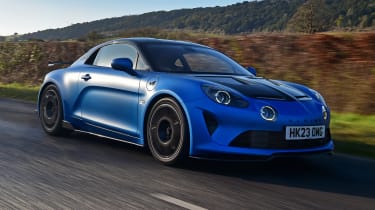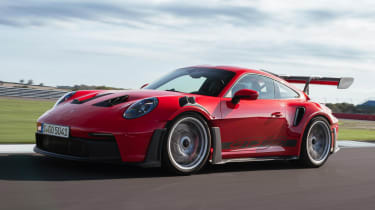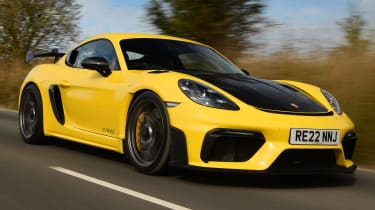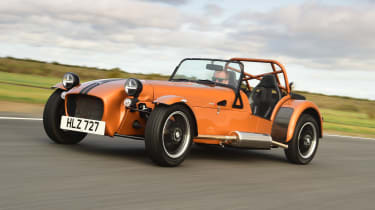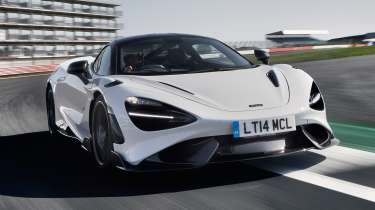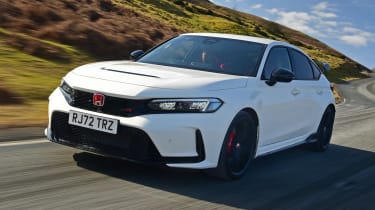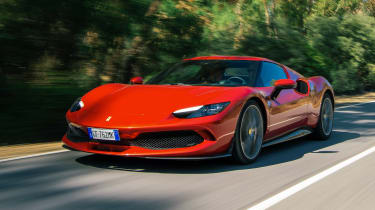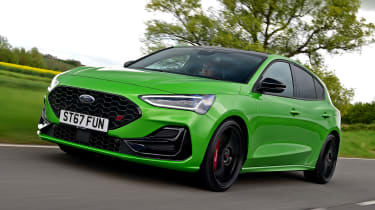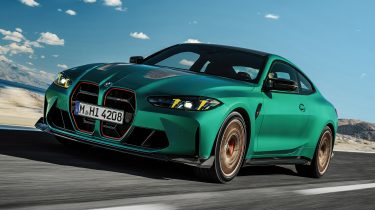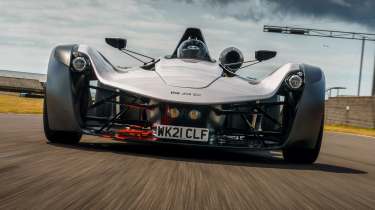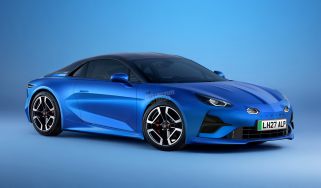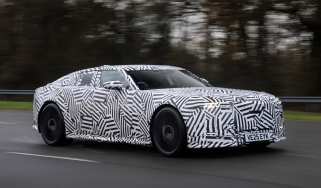Best track day cars 2025
Whether you're looking to shave tenths off your lap time or simply want to have fun, these are the UK's best track day cars
The best track day cars thrive on being pushed to the limit within the safe confines of a circuit, but not all are so extreme that they’ll shake your fillings loose on the way home. Some track day cars are stripped back to focus on the raw experience of driving, while others provide more everyday usability. Whatever your preference, buckle up as our expert road testers reveal the best track day cars to buy.
Best track day cars
- Alpine A110 R
- Porsche 911 GT3 RS
- Porsche Cayman GT4 RS / Spyder RS
- Caterham Seven
- McLaren 765LT
- Honda Civic Type R
- Ferrari 296 GTB
- Ford Focus ST
- BMW M4 CS
- BAC Mono
1. Alpine A110 R
- Prices from £91,500
| Pros | Cons |
|
|
Initially, the Alpine A110 was conceived primarily with road use in mind, but the A110 R flips that notion on its head. The standard car is still available for those who prefer its friendlier attitude and want to use it day-to-day, but to find out what the platform is truly capable of, you need to strap into the R's carbon bucket seats.
Do so, and you might be disappointed to find it's not meaningfully faster than cheaper A110 S and GT models, which are significantly cheaper than the R. In fact, the R uses the same 296bhp 1.8-litre turbocharged engine as those versions, but thanks to carbon fibre body panels it loses 34kg over the already featherweight A110 S.
It also gets adjustable suspension, reworked aerodynamics and Michelin Cup 2 tyres, reigning in the entertaining but ultimately less effective handling traits of the A110 on a circuit. It feels at ease on the limit as a result, goading you to drive harder and rewarding a more committed approach. Happily, the A110 R is still adept on the road, even though it's lost some of the car's trademark ride comfort along the way.
2. Porsche 911 GT3 RS
- Prices from £193,000
| Pros | Cons |
|
|
Porsche has a great record of producing special, stripped back and single-minded GT cars which have always sat near the top of every track day junkie’s wish list, and it comes as no surprise that the latest 911 GT3 RS is the most thrilling iteration yet. Bedecked with fins, vents and a truly enormous rear wing, the RS asserts its intentions before you’ve even slid into its carbon fibre bucket seat, ready to attack a circuit.
And attack you most certainly can, since the RS generates 860kg of downforce at 177mph. However, even with a DRS system inspired by Formula 1, a standard GT3 can cling to the coat-tails of its flagship sibling down the straights, as the RS offers only a slightly healthier 518bhp. Still, it fires to 62mph from rest in just 3.0 seconds, with the rev counter sweeping all the way to 9000rpm in the process.
After the gut-punching acceleration, little can prepare you for the sheer cornering potential of the GT3 RS; it drives like a GT3 Cup car that's been reconfigured for road use, rather than a street car that gives the impression of a racing car. On Michelin Cup 2 tyres the braking forces are immense, the RS bleeding off speed at a startling rate, while fast corners reveal a performance ceiling that only the most talented drivers can touch.
3. Porsche 718 Cayman GT4 RS/Spyder RS
- Prices from £125,500
| Pros | Cons |
|
|
We waited years for a fully uncorked Porsche 718 Cayman in the mould of a 911 GT3 RS, and Porsche has finally delivered exactly that. Powered by a scintillating 4.0-litre flat-six from Porsche's motorsport division, the Cayman GT4 RS has the firepower to thrill on track and the chassis is also up to the task. If you prefer the open air, there’s the option of the Spyder RS, too.
With a highly adjustable, bespoke suspension setup with ball joints throughout (rather than rubber bushings), the GT4 RS drives with supreme clarity and alertness, pivoting around its centre point as it pulls grip from the tarmac. It's noticeably less extreme than the GT3 RS - chiefly because of its downforce deficit - but the 718 is on a different plane to most road cars.
Admittedly, the GT4 RS feels uncompromising thanks to its track-leaning DNA, and the gravelly intake roar from the engine can grate when you're cruising. It's the price you pay for a once-in-a-generation Porsche GT car, one we never thought would see the light of day.
4. Caterham Seven
- Prices from £29,500
- Best value for money
| Pros | Cons |
|
|
The Caterham Seven is a formidable track car to its core, with every distraction and ounce of fat carved away. It’s a perfect car to learn about track driving with and it’s cheap to run, tool.
There's a wealth of used examples available with various power outputs, but if you're looking at a new purchase the current range is pretty straightforward. Beginning with the 84bhp Seven 170, the lineup includes the retro-styled Super Seven and more powerful 360, 420 and 620 models. You can even buy a Race Package version.
The bill for a new Seven can add up pretty quickly if you delve into the options list, but if your main focus is taking the car out on track rather than a B road blast, you'll want to specify the R Pack which adds sports suspension, carbon fibre trim, composite race seats, four-point race harnesses, a shift light and a limited-slip differential. If money is no object and you're feeling particularly brave, maybe try out the ferocious 620 which accelerates from 0-62mph in 2.79 seconds and will go on to a top speed of 155mph.
5. McLaren 765LT
- Prices from £280,000
- Fastest acceleration
| Pros | Cons |
|
|
If you're going to revive the iconic "long tail" moniker of the McLaren F1 GTR Le Mans car, you need to be certain that the model in question is worthy of the badge. Thankfully, having driven the 765LT, this car stands amongst McLaren’s greatest achievements.
The 765LT offers a genuinely breathtaking turn of pace that gives the P1 hypercar a headache. With a bombastic 755bhp twin-turbocharged V8, the 765LT’s rear tyres can barely contain the fury put through them, but the chassis bristles with enough information to help modulate and apply maximum power to the road.
As the speed climbs, the LT’s extra downforce over the 720S raises the limits even further, but you need to be sharp-witted to stay in tune with the car. Thankfully - and unlike most modern supercars - the 765LT uses hydraulically-assisted power steering, which is transparent and confidence inspiring in feel.
6. Honda Civic Type R
- Prices from: £50,050
| Pros | Cons |
|
|
Starting from a shade over £50,000, you’d expect the FL5 Honda Civic Type R to be a pretty spectacular hot hatchback. And it’s good news, as not only does this Type R have some of the best driving dynamics and performance in its class, it can also make a mockery of genuine sports cars costing twice as much. It’s that good.
The Type R hints at its magic before you’ve even set off, the thin-rimmed Alcantara steering wheel and teardrop gear knob falling perfectly to hand. Its track day credentials quickly show themselves on the move, too, with a definite edge to the ride and a tightly-wound feel to the engine.
The latest generation of four-wheel drive hot hatches may be quicker off the mark, but none of them drive with the intensity of the 324bhp Type R. It hunts for grip and carries incredible cornering speed, jinking over bumps and scrabbling for traction but always staying within itself and sending clear messages to the driver. It feels more like a Super Touring car than a hot hatchback, which pays dividends on a track. But wherever you decide to get your driving thrills, the Civic Type R will feel at home.
7. Ferrari 296 GTB
- Prices from: £241,550
| Pros | Cons |
|
|
In pure speed terms, the 819bhp Ferrari 296 GTB is one of the most fearsome cars on this list. But a 2.9-second 0-62mph time isn't its most impressive feat; that would be its ability to combine electrified tech with a bewitching driving experience.
The 296, with its wailing hybrid V6 engine and fluid, weight-free feel, does this better than any other competitor. It shrugs off the additional mass of its plug-in hybrid electronics and delivers startling performance on road and track, while also being able to creep through towns and cities in fully electric mode.
Ferrari’s hybrid supercar is a surprisingly playful, deeply rewarding machine to drive on a circuit. It requires absolute concentration to drive on the limit, but gives back in equal measure.
8. Ford Focus ST
- Prices from £42,900
- Best for daily use
| Pros | Cons |
|
|
This wouldn’t be a track car list without a fast Ford making an appearance. Unfortunately, the Ford Focus ST appears set to follow the Fiesta ST into the history books in the near future, but for now it’s still a delightful hot hatch that’ll take on circuits and school runs in equal measure.
It’s not as fast (or as cheap) as some of its rivals, but the Focus ST offers a very enjoyable level of driver engagement. The turbocharged 2.3-litre petrol engine produces 276bhp and 420Nm of torque, all of which is delivered to the front wheels. Plant your foot and an electronically-controlled limited slip differential keeps the power planted down, resulting in a 0-62mph time of 5.7 seconds.
It’s driver engagement where the Focus shines the most, though, as its chassis takes on even the tightest of corners with little fuss. There are three pedals and a six-speed gearbox for the fully-fledged driving purists, too.
9. BMW M4 CS
- Prices from £120,500
| Pros | Cons |
|
|
The BMW M4 CS is a pricier car than the regular M4, but the extra spend results in a lighter performance coupe that comes with extra power and more focused suspension. It’s these alterations that extract the very best from the fiery 4 Series.
The M4’s 3.0-litre twin-turbo six cylinder petrol engine is tweaked in the CS to deliver 542bhp and 650Nm of torque. These increased figures come courtesy of a retune along with a lighter crankshaft and friction reduction measures. The outcome is a 0-62mph time of just 3.4 seconds, as well as a limited 188mph top speed.
It’s not only straight lines where the M4 CS packs a supercar-rivalling punch, either, as its reduced kerb weight and lower, stiffer suspension allow it to tame corners in its stride.
10. BAC Mono
- Prices from £215,000
| Pros | Cons |
|
|
If, for whatever reason, the Caterham Seven offers too much practicality for your track day tastes, the BAC Mono could be the car for you. This windowless, doorless, roofless machine is designed with performance and weight reduction at the top of its agenda — indeed, it only has one seat.
Its six-figure price tag means this is purely a toy for those with hefty bank balances, but for the fortunate few the Mono will blast them from 0-62mph in under three seconds, so you may want to wear a full face helmet.
Because it’s so light, the BAC mono doesn’t require an enormous engine that’s fed by forced induction. Instead, you’ll find a naturally-aspirated 2.5-litre four cylinder at its heart, with 311bhp and 313Nm. These figures might not look much at first glance, but the Mono’s 570kg kerb weight means a power-to-weight ratio of 546bhp per tonne.
Now read our list of the best performance cars...


